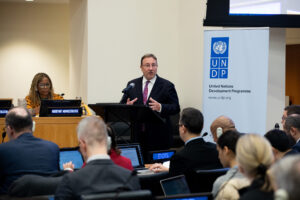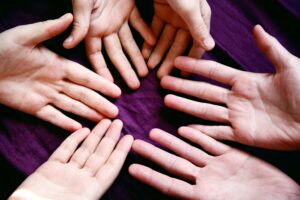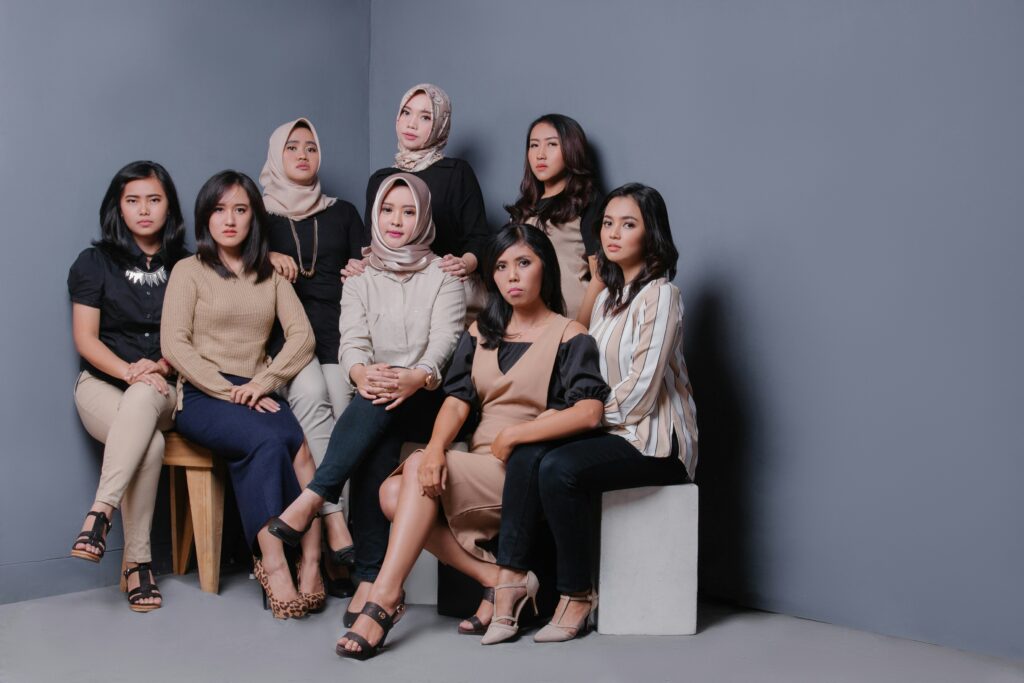In the sprawling corridors of Makerere University, Uganda, a computer science student named Chris faced a familiar struggle that plagues countless African students: having the knowledge and ambition to excel but lacking the essential tools. For months, Chris had been navigating his studies without a laptop—a fundamental necessity in today’s digital academic landscape. That changed when a complete stranger, through a revolutionary app called Neibar, handed him a fully functional laptop with no strings attached.
Chris’s story embodies the transformative potential of Neibar, Africa’s pioneering free-sharing platform that’s challenging conventional notions of resource distribution in communities across the continent.
The Staggering Reality of African Waste
Africa’s waste crisis presents a compelling paradox that inspired Neibar’s creation. Only about 4% of the waste generated in Africa is recycled, often by informal actors, while Sub-Saharan Africa collects about 44 percent of waste while Europe and Central Asia and North America collect at least 90 percent of waste. This inefficiency occurs alongside widespread need, creating a gap that traditional economic models have failed to address effectively.
The statistics paint a sobering picture: by 2025, sub-Saharan Africa is projected to generate 244 million tonnes of household solid waste, up from 174 million tonnes in 2016. Despite 70% to 80% of this waste being recyclable, the vast majority ends up in dumps and landfills, often due to lack of infrastructure and economic incentives.
The Visionary Behind the Platform
Roland Namwanza, the software developer who founded Neibar, witnessed this waste-need paradox firsthand in his Ugandan community. Unlike entrepreneurs focused on creating profitable marketplaces, Namwanza envisioned something radically different: a platform where generosity, not commerce, drives resource circulation.
“We witnessed perfectly functional items going unused while community members struggled to access basic necessities,” Namwanza explains. “Rather than building another transactional platform, we wanted to create a space where giving becomes the primary economic engine.”
This philosophy represents a fundamental shift from the predominant sharing economy models that have emerged globally, most of which still center around monetary exchange.
How Neibar Transforms Giving into Community Building
The Mechanics of Free Sharing
Neibar operates on elegantly simple principles. Currently available as an Android application, the platform allows users to list items they no longer need and offer them to community members at no cost. Since launching publicly in July 2025, the platform has facilitated the distribution of diverse items ranging from household goods and electronics to university textbooks and examination papers.
The platform’s user experience prioritizes equity and community welfare through several key features:
First-Come, First-Served Reservation System: When items are listed, users receive email notifications and can reserve items on a priority basis, ensuring fair distribution.
Built-in Communication Tools: The platform includes messaging features that enable givers and receivers to coordinate safe, public meeting locations for item exchanges.
Anti-Hoarding Mechanisms: To prevent commercial exploitation, users are limited to claiming only two items per day, ensuring broader community access to resources.
Optional Item Swapping: While maintaining its free-giving core, the platform also accommodates users who wish to exchange items directly.
Real-World Impact Stories
The platform’s impact extends far beyond individual transactions. University students have become particularly active users, sharing critical academic resources like past examination papers that can significantly impact academic success. This organic adoption in educational communities demonstrates how digital platforms can address systemic resource inequalities.
Beyond academia, Neibar has facilitated the distribution of electronics, clothing, books, groceries, and office supplies—items that represent significant expenses for many African families while often sitting unused in others’ homes.
Scaling Across Borders
Current Reach and User Base
With 250 active users primarily concentrated in Uganda, Neibar has begun expanding across East and West Africa, with growing user communities in Kenya, Nigeria, and South Africa. This geographic diversification suggests that the platform addresses universal needs that transcend national boundaries.
However, Namwanza acknowledges that expansion into Western markets has proven challenging, primarily due to the absence of local representatives and the different cultural contexts around giving and resource sharing.
The Community-First Growth Strategy
Unlike typical tech startups that prioritize rapid user acquisition, Neibar focuses on building sustainable giving communities. This approach reflects Namwanza’s belief that genuine platform success depends on cultural shifts toward generosity rather than mere user numbers.
The Economics of Free: A Sustainable Business Model?
Challenges to the No-Money Philosophy
Neibar’s commitment to remaining entirely free presents both idealistic appeal and practical challenges. The platform currently operates through Namwanza’s personal funding from his employment and minimal family contributions, a model that becomes increasingly difficult to sustain as user bases expand and technical demands grow.
The fundamental tension lies in the platform’s operational costs—server maintenance, app development, customer support, and expansion efforts—which require funding while the platform generates no revenue.
Potential Funding Pathways
Despite Namwanza’s current focus on impact over investment, several funding avenues could support Neibar’s growth while maintaining its free-giving mission:
NGO and International Development Grants: Organizations focused on waste reduction, community development, and circular economy initiatives could provide grant funding aligned with Neibar’s social impact goals.
Corporate Social Responsibility Partnerships: Companies with sustainability commitments could sponsor platform operations as part of their environmental and community initiatives.
Government Partnerships: Local governments interested in waste reduction and community development could support platform expansion as part of broader policy initiatives.
Addressing Mindset Barriers
One of Neibar’s most significant challenges involves shifting community attitudes toward giving. In markets where selling used items through platforms like OLX or Facebook Marketplace has become normalized, convincing users to give items away freely requires substantial cultural messaging and community building.
This challenge is particularly pronounced in economically stressed communities where every potential source of income matters to families’ survival.
Comparative Context: How Neibar Fits in the African Tech Landscape
Distinguishing from Existing Platforms
While Africa has seen the rise of various sharing and financial platforms—from mobile money services like M-Pesa to fundraising platforms like M-Changa—Neibar occupies a unique niche by completely removing monetary transactions from resource sharing.
This approach contrasts sharply with global sharing economy giants like Airbnb, Uber, or even local African variants, which facilitate transactions while taking percentage cuts. Neibar’s model more closely resembles community bulletin boards or gifting networks, but with the scalability and convenience of digital platforms.
Learning from Global Models
Internationally, platforms like Freecycle, Buy Nothing Project, and Freegle have demonstrated sustainable community-based sharing models. However, these platforms emerged in different economic contexts with established waste management infrastructure and different cultural attitudes toward giving.
Neibar’s challenge involves adapting free-sharing concepts to African contexts where resource scarcity is often more acute, making the platform’s potential impact more significant but adoption potentially more complex.
Environmental and Social Impact Potential
Addressing Africa’s Circular Economy Gap
Municipal solid waste generation is predicted to grow from 2.1 billion tonnes in 2023 to 3.8 billion tonnes by 2050 globally, with Africa contributing disproportionately to this growth. Neibar’s model offers a community-driven approach to extending product lifecycles before items enter waste streams.
By facilitating direct transfers between community members, the platform could help reduce the estimated 96% of African waste that currently goes unrecycled, turning waste streams into community resources.
Social Cohesion and Community Building
Beyond environmental benefits, Neibar facilitates social connections that transcend traditional economic relationships. When community members give and receive freely, they build networks based on mutual aid rather than market transactions.
This community-building aspect could prove particularly valuable in rapidly urbanizing African contexts where traditional social support systems are often strained.
Future Prospects and Expansion Plans
Technology Development Roadmap
Currently available only on Android, Neibar plans to expand to iOS and web platforms to increase accessibility. The platform also aims to enhance user experience through improved matching algorithms, expanded notification systems, and enhanced safety features for item exchanges.
Geographic and Demographic Expansion
Namwanza envisions expanding to more urban areas across Africa while developing partnerships with local governments and NGOs to scale impact. The platform’s success in university communities suggests potential for targeted expansion to other educational institutions across the continent.
Policy and Partnership Opportunities
Neibar’s model aligns with several policy priorities across African governments, including waste reduction, community development, and informal economy support. Strategic partnerships with municipalities, educational institutions, and development organizations could accelerate adoption while maintaining the platform’s community-centered approach.
Lessons for African Tech Innovation
Rethinking Success Metrics
Neibar’s approach challenges conventional startup success metrics by prioritizing social impact over revenue generation. This model suggests alternative pathways for African tech innovation that address local needs while building sustainable communities.
The Role of Patient Capital
The platform’s development demonstrates the need for patient capital and alternative funding models that support social impact innovations without requiring immediate profitability. This approach could prove crucial for addressing Africa’s unique development challenges through technology.
Community-Centered Design
Neibar’s focus on changing community behaviors rather than simply facilitating existing transactions represents a more ambitious but potentially more transformative approach to platform development.








